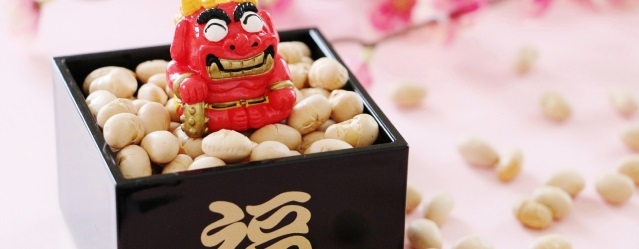Setsubun: Bean-throwing event in Japan
節分 日本の豆まき行事

February 3 is known as Setsubun in Japan. Setsubun was traditionally regarded as the day before a change in season, and thus there were four Setsubuns in a year; one for each day before the start of spring, summer, fall, and winter.
日本では、2月3日は節分として知られています。従来、節分は季節の変わり目の前日と考えられていたため、一年に4回の節分があり、春・夏・秋・冬が始まる各前日が節分でした。
However, Japanese people especially treasured the first day of spring as the beginning of a year, so the word Setsubun came to be regarded as the day before the first day of spring.
しかし、日本人は一年の始まりとして春の最初の日を特に大切にしました。そのため、節分という言葉は春の最初の日の前日と考えられるようになりました。
People throw roasted soybeans on the day of Setsubun in a custom which is reported to have come from China.
中国から伝わったとされる慣習において、節分の日には煎った大豆を投げます。
The ceremony is held to drive away the disasters and diseases that often occur at the time of seasonal change by using Onis (ogre) to resemble the disasters and the diseases.
この行事は、季節の変わり目によく起こる災害や病気を追い払うために、災害や病気を象徴する鬼を用いて行われます。
The master of the house is supposed to throw beans but fathers usually play a role wearing an Oni mask and children throw beans at the Oni.
本来は家長が豆を投げることになっていますが、一般的には父親が鬼の面を被る役を担い、子どもたちが鬼に豆を投げます。
Children scatter beans and there are cheerful chants of “Oni wa soto, fuku wa uchi (In with good fortune, out with the ogres).” It is believed that if people then eat the number of beans that corresponds to their age, they will be healthy for the whole year.
子どもたちは豆をばら撒き、「鬼は外、福は内(幸運は内に、鬼は外に)」と元気な掛け声があがります。そして、自分の歳の数だけ大豆を食べれば、その一年を健やかに過ごせると信じられています。
The soybeans have to be roasted, and it is believed to be bad luck if unroasted beans are used and a sprout then appears from beans left on the ground.
その大豆は煎られたものである必要があります。もし、煎られていない大豆を使い、地面に残った豆が発芽すると縁起が悪いと信じられています。
The ritual also has the meaning of banishing the ogre by eating all of the beans. This bean-throwing event takes place at shrines and temples as well as at home.
この儀式には、豆を全部食べてしまうことで、鬼を退治するという意味もあります。この豆まき行事は、神社とお寺、また、家庭でも行われます。
【重要なフレーズ】
一年の始まり:the beginning of a year
~の前日: the day before …
炒った大豆: roasted soybeans
慣習:custom
~を追い払う:drive away …
季節の変わり目に: at the time of seasonal change
家長: the master of the house
~に~を投げる:throw … at …